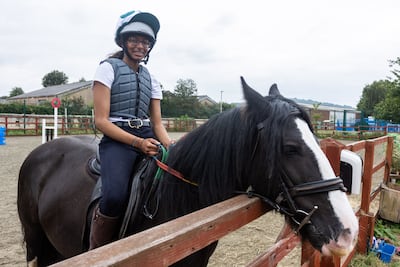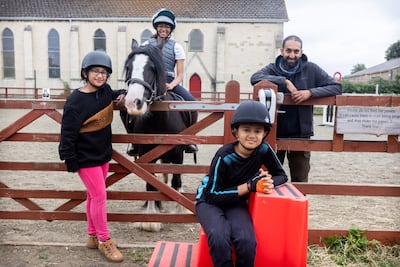Tucked away in the backstreets of one of the most deprived and ethnically diverse areas of Gloucester, a city with a population of 130,000 people in the west of England, sits a tiny community-run riding school.
Blink and you would miss it. It is squeezed between rows of terraced houses and a large church.
Within a radius of a mile, 50 languages are spoken. But the one word that everyone locally understands is 'hope'. That feeling of hope is provided in many ways by an amazing and inspirational man, a devout Muslim by the name of Imran Atcha.
Ten years ago, the 50 year old set up the St James City Farm and Riding School, and against all odds – and the recent pandemic – he is succeeding, driven by his faith and belief that horses and exposure to animals and nature can help to cure many societal ills.
He has always loved horses and what they stand for; as a boy he would often dream about them. But being from a poor family, he never had the opportunity to ride until adult life when he scraped together £500 ($693) to buy a share in a horse and taught himself.

It transformed him as a person and gave him purpose. His mission now is to provide opportunities to young children aged from four to 12 from the predominantly Muslim community who would not otherwise have the chance to learn to ride.
Underpinning everything is his desire to educate and reconnect fellow Muslims with their equine heritage. After all, the Middle East is the cradle of the thoroughbred.
“I struggled myself for many years to enter the horse world, so now I aim to make it as easy as possible for children from the inner city to learn about horses,” Mr Atcha says.
“I am a Muslim myself and a high proportion from my area are third generation Muslim immigrant children who I feel have lost their roots. Children are spending hours a day on screen based entertainment; phones and computer games and there is a big disconnection from nature.
“Religiously when you connect with nature and animals, you connect with God. When the children come to horses they completely change. You see that development and teachers and parents can’t believe it," Mr Atcha says.
He is also keen to teach the children about Arabic heritage.
“Many have come from rural communities into the city and lost that connection. Horsemanship is a big part of our heritage from the earliest of times. We were experts; this is about connecting people and explaining that this is their culture," he says.
“If they knew their history which is so rich in horsemanship from a cultural and religious perspective, they would take great pride and interest in it.
“There are many religious tracts in the Qu’ran about the benefits of horsemanship, lots of advice from Prophetic traditions - peace be upon him – about goodness being in horses. Time spent with horses is not considered wasted.
“There are untold benefits in being with horses and untapped talent in the area that is waiting to be discovered, and our little charitable project is one part of reviving this lost heritage, developing our young people and bringing communities from all backgrounds together at the same time.”

Many Muslims in Britain tend to associate horses and racing with gambling and alcohol, which of course are forbidden in the Qu’ran, Mr Atcha says.
“I tell them we are only interested in the sport and the riding side. That is what matters. The other issue is that living in an inner city no one really has an idea how to get involved. When people see someone like me from my background, then the young lad down the road might come.
“There is a lot of talent but it has to be discovered. The (racing) industry (in Britain) needs to realise there is no doubt a huge amount of hidden talent in communities such as ours.
“Sometimes I see a kid doing a wheelie on a bike down the street. I think that kid’s got it. He’s got balance — if we put him on a horse he could be good. Half the thing about riding is confidence and balance.”
Slowly but surely he is winning hearts and minds. Several children who have learnt to ride at his school have gone on to compete in pony racing events across the country. They are watched with great pride by their families for whom Mr Atcha has provided something they would never have thought possible.
He only charges £2.50 for a starter lesson and £5 thereafter. And if families cannot afford that, he finds a way to support them. One or two have found work in the stables.

“The reaction has been amazing,” Mr Atcha says. “Even if their child only comes sixth out of seven in a race they are all so happy. It is like their Olympics. Some of the people we have helped are going through very difficult situations at home. Animals and riding are crucial to their life.”
However, Mr Atcha has become a victim of his own success. His programme has captured the hearts and minds of people in the community to such an extent that he cannot keep up with demand.
He provides lessons for 40 children a week, often working around their commitments to their madrassa religious education that takes place after school. He has more than 100 children on a waiting list but has only five ponies.
Fundraising is a constant struggle. “We get private donations and support from other organisations but it is not enough. For instance the roof to our office where we used to hold a creche to help raise money, leaks and we cannot afford to have it mended.”
He has a dream and a vision. “If we had the money we could develop a second stable off site in the countryside where we could teach more kids not just about riding, but husbandry, grooming, the care for animals.
“There is a huge influence from the Middle East in British racing. But I am sure they would not be aware of a place like this. But you always live in hope!”
For some of his pupils it has been a life-changing experience. The best example is 15-year-old Aamilah Aswat. She lives in the street behind the stable and began riding as a seven year old. From the first moment she loved it. Last autumn, she won a pony race at Lingfield watched by her proud father.
“It was the best feeling ever,” she says.
She has shown such talent that she has won a scholarship to the British Riding School in Newmarket, where she is learning to develop her riding skills. The scholarship is named after Khadija Mella, who two years ago won the prestigious Magnolia Cup charity race for amateur female riders at the famous Glorious Goodwood festival.
“Hopefully after school I will be able to move on to work in a race yard. My ambition is to win the Grand National! I really want to be a jockey that is the aim.”
She cannot thank Mr Atcha enough. “Without Imran I would never have had this opportunity. I am so grateful to him. I don’t know where I would be without this place. It has changed my life massively. Horses and animals and riding in general are very important to young people.
“As a Muslim girl I have come to learn about our history and that many of the Prophets used to ride horses. So it is very important from that perspective.”
Mr Atcha has one other ambition - to ride Arab horses on the sand dunes of the Middle East.
“I have never been there. The nearest I have got is riding on the beach in Morocco. I also follow on YouTube the Bedouin horse-master in Abu Dhabi Ali Al Ameri. I hope one day to meet him and learn from him.”
Maybe, just maybe, his dream will come true. He deserves it.
